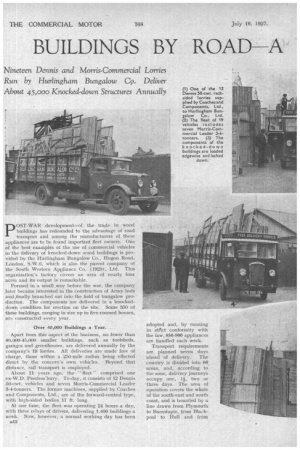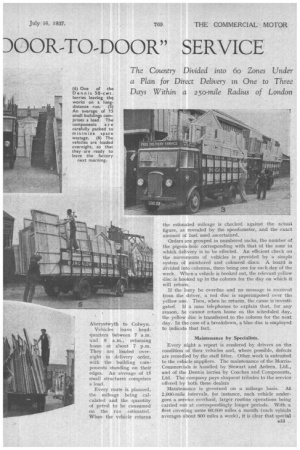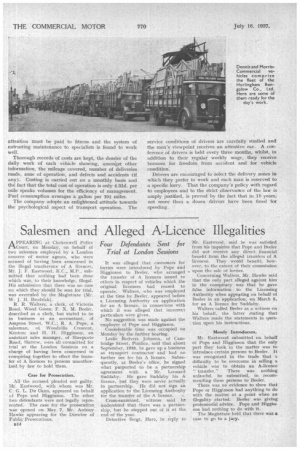BUILDINGS BY ROAD • A
Page 46

Page 47

Page 48

If you've noticed an error in this article please click here to report it so we can fix it.
DOOR-TO-DOOR" SERVICE
Nineteen Dennis and Morris-Commercial Lorries Run by Hurlingham Bungalow Cp. Deliver About 45,000 Knocked-down StTuctures Annually The Country Divided into 6o Zones Under a Plan for Direct Delivery in One to Three Days Within a 250-mile Radius of London pOST-WAR development of the trade in wood buildings has redounded to the advantage of road transport and among the manufacturers of these appliances are to be found important fleet owners. One of the best examples of the use of commercial vehicles in the delivery of knocked-down wood buildings is provided by the Hurlingham Bungalow Co., Hugon Road, London, S.W.6, which is also the parent company at the South Western Appliance Co. (1929), Ltd, This organization's factory covers an area of nearly four acres and its output is remarkable.
Formed in a small ,way before the war, the company later became interested in the construction of Army huts and ,finally branched out into the field of bungalow production. The components are delivered in a knockeddown condition for erection on the site. Some 350 of these buildings, ranging in size up to five-roomed houses,
are constructed every year..
Over 40,000 Buildings a Year.
Apart from this aspect of the business, no fewer than 40,000-45,000 smaller buildings, such as toolsheds, garages and greenhouses, are delivered annually by the company's 19 lorries. All deliveries are made free of charge, those within a 250-mile radius being effected direct by the concern's own vehicles. Beyond that distance, rail transport is employed.
About 11 years ago, the " fleet ". comprised one ex-W.D. Peerless.lorry. To-day, it consists of 12 Dennis 50-cwt. vehicles and seven Morris-Commercial Leader 3-4-tonners. The former machines, supplied by Coaches and Components. Ltd., are of the forward-control type,
with high-sided bodies 17 ft. long. '
, At one time, the fleet was operating 24 hours a day, with three relays of drivers, delivering 1,400 buildings a week. Now, however, a normal working day has been n12 adopted and, by running in strict conformity with the law, 850-900 appliances are handled each week.
Transport requirements are planned seven days
ahead of delivery. The country is divided into 60 areas, and, according to the zone, delivery journeys occupy one, 14, two or -three days. The area of operation covers the whole of the south-east and south coast, and is bounded by a line drawn from Plymouth to Barnstaple, from Blackpool to _Hull and from Aberystwyth to Colwyn.
Vehicles leave headquarters 'between 7 a.m. and 8 a.m„ returning home at about 7 p.m. They are loaded overnight in delivery order, with the building components standing on their edges. An average of 15 small structures comprises a load.
Every route is planned, the mileage being calculated and the quantity of petrol to be consumed on the run estiniated. When the vehicle returns • the estimated mileage is checked against the actual figure, as revealed by the speedometer, and the exact amount of fuel used ascertained.
Orders are grouped in numbered racks, the number of the pigeon-hole corresponding with that of the zone in which delivery is to be effected. An efficient check on the movements of vehicles is provided by a simple system of numbered and coloured discs. A board is divided into columns, there being one for each day of the week. When a vehicle is booked out, the relevant yellow disc is hooked up in the column for the day on which it will return.
If the lorry be overdue and no message is received from the driver, a red disc is superimposed over the yellow one. Then, when he returns, the cause is investigated. If a man telephones to explain that,, for any reason, he cannot return home on the scheduled day, the yellow disc is transferred to the column for the next day. In the case of a breakdown, a blue disc is employed to indicate that fact.
Maintenance by Specialists.
Every night a report is rendered by drivers on the condition of their vehicles and, where possible, defects are remedied by the staff fitter. Other, work is entrusted to the vehicle suppliers. The maintenance of the MorrisCommercials is handled by Stewart and Ardent, Ltd., and of the Dennis lorries by Coaches and Cornponen, Ltd. The company pays eloquent tributes to the service offered by both these dealers Maintenance is governed on a mileage basis. At 2,000-mile intervals, for instance, each vehicle undergoes a service overhaul, larger routine operations being carded out at correspondingly longer periods. With a fleet covering some 60,000 miles a month (each vehicle averages about 800 miles a week), it is clear that special attention must be paid to fitness and the system of entrusting maintenance to specialists is found to work well.
Thorough records of costs are kept, the dossier of the daily work of each vehicle showing, arnorcgst other information, the mileage covered, number of deliveries made, zone of operation, and defects and accidents (if any). Costing is carried out on a monthly basis and the fact that the total cost of operation is only 4.31d. per mile speaks volumes for the efficiency of management. Fuel consumption averages a gallon per 1131. miles. The company adopts an enlightened attitude towards the psychological aspect of transport operation. The
service conditions of drivers are carefully studied and the men's viewpoint receives an attentive ear. A conference of drivers is held every three months, whilst, in addition to their regular weekly wage, they receive bonuses for freedOm from accident and for vehicle condition.
Drivers are encouraged to select the delivery zones in which they prefer to work and each mad is reserved to a specific lorry. That the company's policy with regard to employees and to the strict observance of the law is amply justified, is proved by the fact that in 11' years, not more than a dozen drivers have been fined for speeding.




























































































